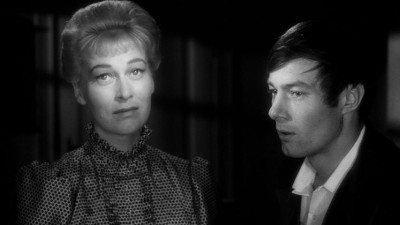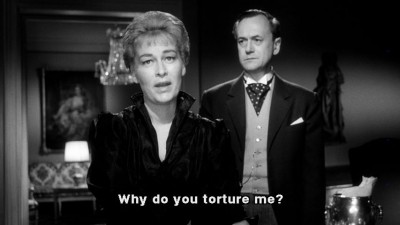
I know I am supposed to revere Carl Theodor Dreyer as one of the greatest of all filmmakers. I understand this. I understand his whole theory of stripping things down their essentials—or in other words, removing all unnecessary items until you no longer have a set, but rather the idea of a room. The problem is I don’t much care. I find his films—with the marginal exception of Vampyr (1932), which is screwy enough to compensate—suffocating, unpleasant and…well, mostly boring. I feel like the movies exist to essentially torture the viewer—for no very good reason except that Dreyer didn’t seem to think to much of mankind on the whole. I do not say they are bad. I say I don’t like them. There is a significant difference between the two ideas. Dreyer mostly strikes me as the filmmaker for folks who think Ingmar Bergman is too frivolous. Certainly, no one is likely to mistake Dreyer’s last film, Gertrud (1964), for frivolous—though one might almost apply that term to its title character.

Gertrud is an oddity from nearly every angle. It is set in some early 20th century era where things are still mostly lit with candles and oil lamps—yet scenes take place in rooms with what looks like Danish Modern furniture and large modern electric table lamps. (I’m sure there is some greater purpose to all this.) The story is all about Gertrud (Nina Pens Rode), a middle-aged opera singer going through some kind of mid-life crisis. She’s opted to leave her politician husband in order to take up with a rather crude young composer, but not only is her husband disinclined to lose her, there’s also an old flame on the scene who wants to rekindle the spark. And, for that matter, there’s some long-suffering admirer hanging around. People talk endlessly—usually without expression and staring into space as they mullygrub about their feelings. This is mostly done in long takes with the characters always carefully standing (or sitting) so that Gertrud’s face gets the keylight. I understand this is all very profound, but I kept thinking I was watching cut-rate Ibsen, and that Gertrud was a singularly unappealing and self-absorbed character who ought to just shut up and go away. In strictly cineaste terms, I am in the minority on this.
Classic World Cinema by Courtyard Gallery will present Gertrud Friday, Jan. 24, at 8 p.m. at Phil Mechanic Studios, 109 Roberts St., River Arts District (upstairs in the Railroad Library). Info: 273-3332, www.ashevillecourtyard.com.




Your choice of a frame grab is none too subtle but it is highly appropriate.
It was irresistible.